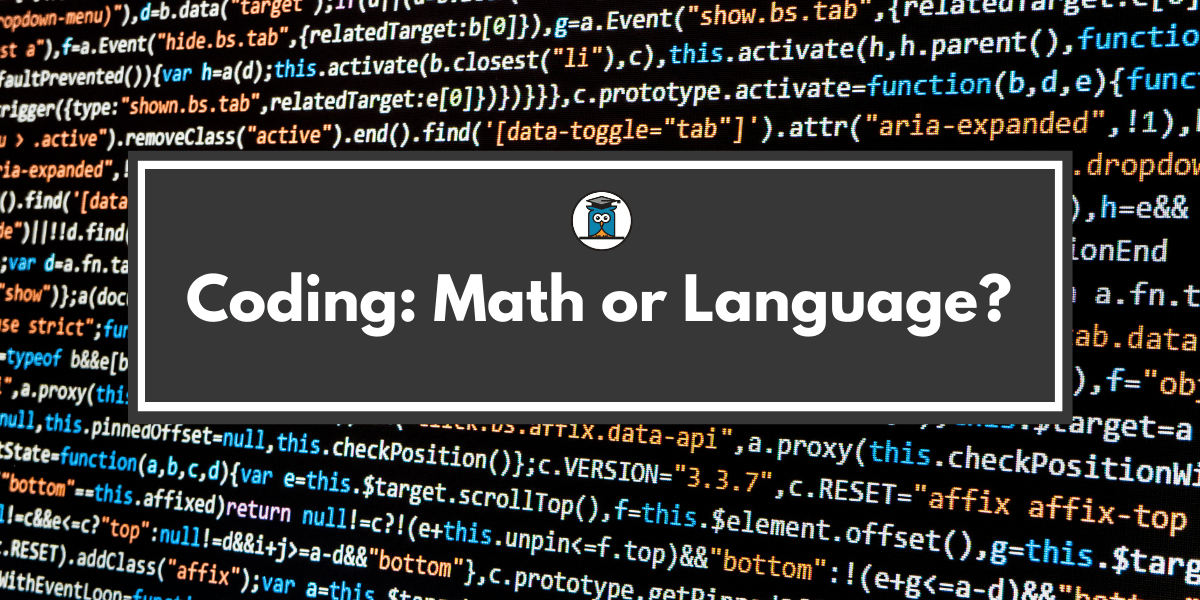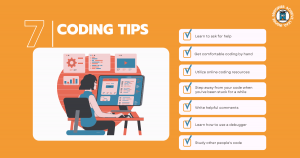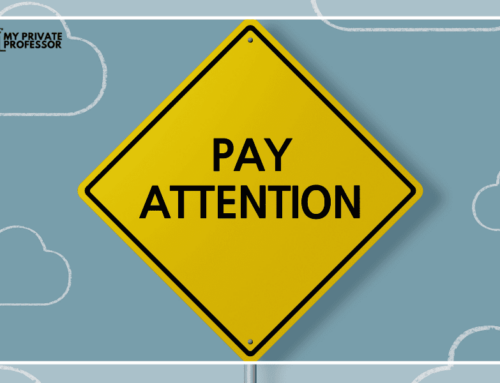When you think about coding or computer science, what comes to mind? Do you automatically go to math? Or do you tend to think about coding as a language?
I’m guessing it’s probably the former. If you think about where coding lies in a curriculum, you’re probably right—it’s usually the math department.
But when you break down the coding building blocks, it seems that the subject may also be pretty similar to language.
So why do we tend to primarily associate coding with math?
One reason may be that some students are more left-brained, and therefore have a more “math-y” outlook. A more probable reason is that, collectively, we’ve learned to associate coding with math. Moreover, it seems that we tend to think about programmers as people who must have strong mathematical skills.
All students certainly have different learning styles, so it would make sense that each student has their own unique perception of math.
But when collective perceptions have consequences, it’s important to debunk certain stereotypes. In this instance, the stereotype is that you must be good at math to code.
As it seems, learning to code may be more like mastering a foreign language than mastering mathematical concepts. And research can back it up.
What does research say about necessary coding skills?
Unfortunately, there’s limited research about necessary skills for computer programmers. One study, though, dives into this, confirming that math is not the sole skill necessary for coding. It’s not even—seemingly—the most important skill!
The University of Washington study
In a 2020 study, researchers at the University of Washington investigated whether learning computer programs closely resembles learning a second language.
They used the programming language Python, and sought to determine whether natural language learning ability predicted one’s ability to learn Python. In addition, they looked at other skills such as general cognitive ability and working memory. Finally, the researchers aimed to see whether numeracy (the ability to work with and understand numbers) predicts one’s ability to learn Python.
The researchers examined three dozen adults’ neuro-cognitive abilities as they learned Python. To do so, researchers instructed participants to complete a series of online lessons and quizzes on Python.
Across the board, the researchers found that language ability most strongly predicted one’s ability to learn Python. Moreover, the time it took participants to learn Python and their accuracy were positively correlated with strong problem-solving and language abilities. It’s also important to note that numeracy didn’t play as large of a role in Python learning ability compared to language ability, cognitive ability, high reasoning ability, and working memory.
While math accounted for only 2% of the difference in how quickly students learned Python, language ability accounted for nearly 20% of this variation. This suggests that language ability may be more important than numeracy when it comes to coding.
Another study, however, found somewhat different results.
The MIT study
At Massachusetts Institute of Technology, four researchers performed brain scans on dozens of participants in an effort to figure out how the brain comprehends computer code. Significantly, they wanted to determine which part of the brain is in charge here—is it the part that performs math…or deals with languages?
Essentially, the researchers were looking at the two major philosophies regarding what it takes to code. That is, people tend to believe one of two theories: that you must be good at math or language to excel in coding.
Similarly to in the previous (University of Washington) study, the researchers in the present study looked at brain responses to Python—however, they also looked at the responses to another programming language, ScratchJr, which MIT helped develop.
In the study, the participants completed different types of math problems and answered questions around sentence structure (language skills).
The results didn’t allow the researchers to determine that either the language skills or math region/processes are responsible for comprehending code.
Instead, they found that the region that became active was one known as the “multiple demand” region. This region is the key player when we solve complex problems—typically those which are “cognitively challenging”.
This region responded to both the language problems and the math problems. The language-related region did respond to sentence-based problems, but responded weakly or not at all to the math problems.
Essentially, the results determined that coding doesn’t rely solely on the math-related or language-related brain processes and region. Instead, the researchers found, coding activates the multiple demand network. This region, although a key role in mathematics, is also linked to logic and general “difficult thinking”.
Coding and gender politics
These findings actually have major implications. Take a look at any college website and find the computer science section. Is it listed under a department within the humanities section? Or, more likely, is it within the math department?
Not only do most colleges and universities include computer science/programming in the math department, but many of these institutions require prerequisites or that you take an advanced math course alongside coding. For a long time, it’s been commonplace to think about coding and computer science as linked to math and engineering. 
Over time, as a result, we’ve ingrained the perception in students that you need to be good at math to be a skilled programmer.
Now, consider this: who, stereotypically, prevails at math? Men.
And the demographics show just this. According to a 2021 global software developer survey, males account for roughly 91.7% of computer developers.
Coding is stereotypically a male field
Stereotypically, mathematics has always been known as a masculine field.
And when you take these cultural notions that we continually reinforce along with students who are susceptible to skewed perceptions around them, you end up with a ton of women who avoid pursuing coding.
“Many barriers to programming, from prerequisite courses to stereotypes of what a good programmer looks like, are centered around math abilities, and that is not born out in our data,” says Chantel Prat, associate professor of psychology at the University of Washington
The thing is, typically, females have higher language skills than males on average.
And based on the findings from the two studies above, it’s evident that language skills may have just as much of a role in learning to code as mathematical knowledge/skills. So seemingly, mathematical prerequisites schools often require of students before taking coding, may not be necessary.
Allowing—and encouraging—more students to enroll in coding classes is critical, considering how the workspace is increasingly seeking and utilizing these skills. In addition, this is certainly an area that deserves heightened attention, since it’s evident that many students are constantly suffering from math anxiety, which may push them to avoid coding.
And based on MIT’s study, it’s clear that we need to do more research on the brain’s processes during coding, and necessary programming skills.
Evidently, the popular belief—that coding skills stem from mathematical skills—needs some rethinking.
Author: Lydia Schapiro








